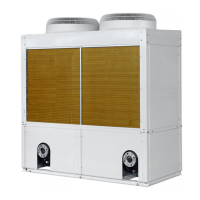D Series Modular Air-cooled Scroll Chillers
39
7.12 Precautions
(1) Take periodic maintenance to the unit to guarantee normal operation.
(2) Once refrigerant leaks, shut down the unit immediately and contact the serviceman. No open re is
allowed in that refrigerant will decompose into toxic gas.
(3) Switch o the main power supply in case of a re hazard and extinguish it with eective measures.
(4) The working environment shall be far away from the inammable substance, such as petroleum and
alcoholic etc. to avoid explosion.
(5) The unit is allowed restarted only after any malfunction is eliminated, otherwise refrigerant or chilled
water would leak, in which case, it is imperative to turn o all switches or the main power supply.
(6) Do not short-circuit the protection device, otherwise it would cause some malfunction.
8 Troubleshooting
8.1 Error Lists and Troubleshooting Measures
Error Possible Causes Troubleshooting Measures
Too high
discharge
pressure
•
There is air or other incondensable gas
inside the system
•
Fins of the condenser are dirty or
clogged
•
The air ow for condensing is insucient
or the fan of the condenser runs
improperly
•
The suction pressure is too high
•
Refrigerant is charged too much
•
Ambient temperature is too high
•
Expel incondensable air and vacuum the
system if necessary
•
Clean ns
•
Repair the fan of the condenser
•
See “Too high suction pressure”
•
Let part of refrigerant out
Too low
discharge
pressure
•
The suction pressure is too low
•
Refrigerant leaks or is charged
insuciently
•
See “Too low suction pressure”
•
Take leakage test and add refrigerant
Too high
suction
pressure
•
The discharge pressure is too high
•
Refrigerant is charged exceedingly
•
Liquid refrigerant ows from the
evaporator to the compressosr
•
The entering chilled water temperature is
higher than the allowable value
•
See “Too high discharge pressure”
•
Let the exceedance of refrigerant out
•
Check and regulate the expansion valve
and be sure the temperature sensor of the
expansion valve is attached with the suction
line closely and tightly insulated
Too low
suction
pressure
•
The ambient temperature is too low
•
The check valve or the drier-lter is
clogged
•
The expansion valve works improperly
•
Refrigerant is insucient
•
The entering chilled water is lower than
the setpoint
•
The chilled water ow is insucient
•
Replace the check valve or the drier-lter
•
Regulate the expansion valve properly or
take a leakage test to the expansion valve
•
Take a leakage test and add refrigerant
•
Check the intallaiton
•
Check the entering/leaving water pressure
and regulate the water owrate
High
pressure
protection
•
The ambient temperature is too high
•
The air ow for condensing is insucient
or the fan of the condenser malfunctions
•
The high-pressure swtichs malfunctions
•
Refrigerant is charged exceedingly
•
Repair the fan of the condenser
•
Check the high pressure switch
•
Check the refrigeration charge and let the
exceedance out

